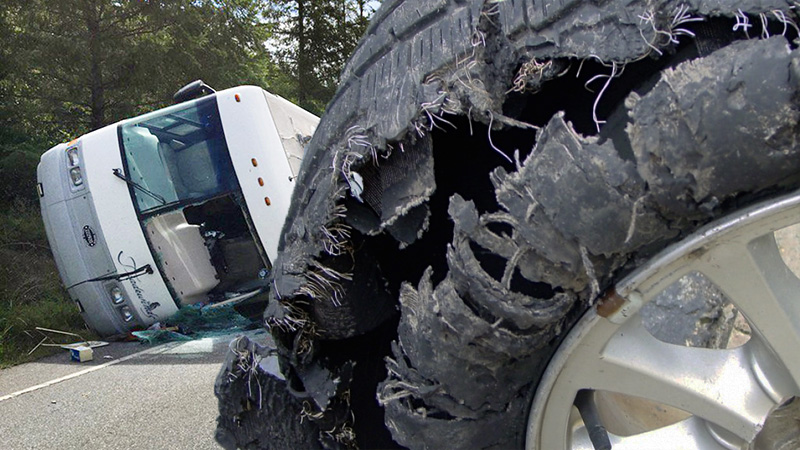Thanks for your support! If you make a purchase using our links in this article, we may make a commission. And, as an Amazon Associate, I earn from qualifying purchases. See the full disclosure here.
There are many things to think about when you live in an RV. Taking care of your tires and avoiding RV tire blowouts is likely at the top of the list, at least it should be.
An RV tire blowout while traveling down the road can damage your rig or cause a more serious accident involving other vehicles and your own.
No one wants to ruin a vacation or have to spend time waiting for repairs. RV tire blowouts have been known to destroy electrical lines, take out propane tanks, and even damage the underside of your rig.
While I don’t think you need to spend every moment of your trip in an anxious state regarding RV tire blowouts, there are several things you can do to put your mind at ease and have a great trip.
Check out these Eight Ways to Avoid RV Tire Blowouts
1. Avoid RV Tire Blowouts by Replacing Tires Regularly
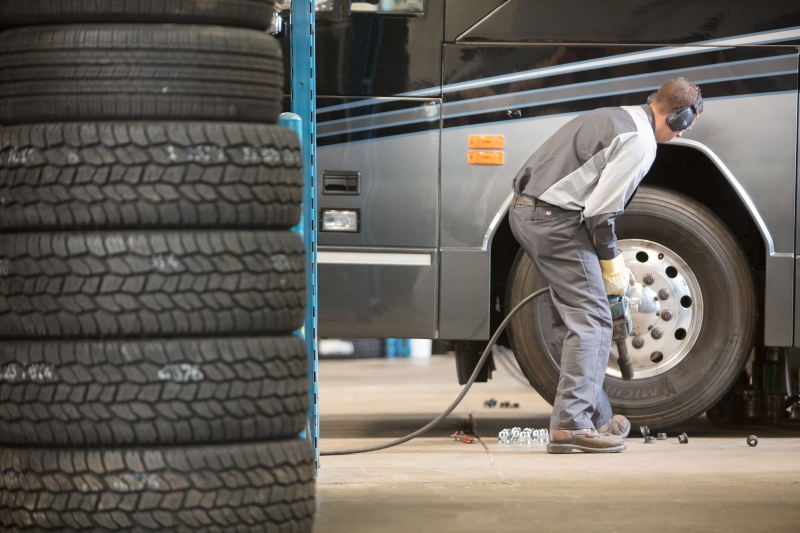
Replacing your tires regularly can go a long way toward keeping you, your family, and your rig safe. Experts say replacing tires every 3-6 years is appropriate, depending on use.
If you full-time in your RV, those tires will probably not last for six years. Get in the habit of checking your tires before every trip.
Look for tread depth, cracking, tread separation, sidewall bubbling, sun damage, and uneven wear.
Also, check your tire pressure and tighten the lug nuts every time you head out.
2. Keep Up with Tire Maintenance to Prevent RV Tire Blowouts
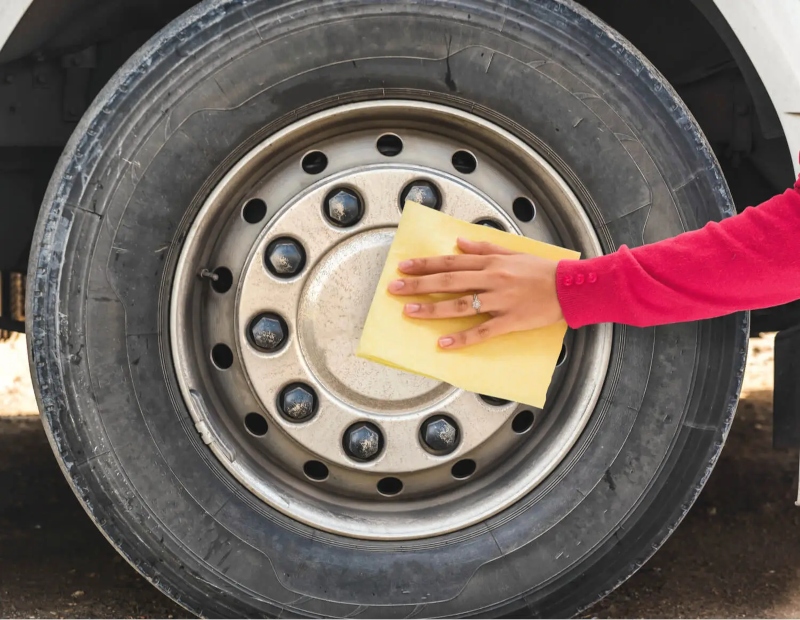
Keeping up with your tire maintenance is critical to avoiding a blowout and a possible accident.
Using the correct tire size, which can be found in your owner’s manual, and taking care of your RV tires are vital. Don’t overlook the most important piece of equipment on your RV that takes the most punishment from the road.
Tire maintenance can include doing a physical check every time you head out. Check tire pressure, check for wear, check for tread depth, and ensure your tires are properly aligned, balanced, and rotated. This should be done at least twice a year or every 3,000 miles.
Make sure the place you park your RV will not cause a problem with your tires. Parking on asphalt is great unless you are in a hot climate. Grass or dirt should be avoided, if possible, for long-term stays but should be an option in a high-temperature situation.
Storing your RV on grass or dirt exposes them to excessive moisture, which could rot your tires. If you have a motorhome, take it out for a spin once a month if you are parked somewhere long-term. This will also keep flat spots from developing when it is parked long-term.
If you have to store your RV on dirt, use jack pads to raise your motorhome or travel trailer off the ground.
3. Avoid Excessive Heat to Prevent RV Tire Blowouts
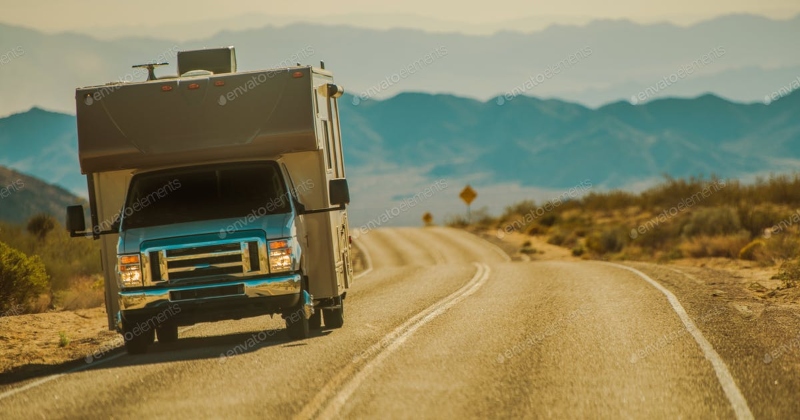
Excessive heat can be caused by driving at high speed, excessive cornering, and frequent braking. Heat weakens the rubber in your tires and causes them to expand.
Slow your speed; RVing is about enjoying the journey, not racing to the finish line. Take frequent brakes in hot temperatures or long travel days to give your RV’s feet a break.
We recommend the 2-2-2 traveling method or a variation of it:
- Travel 200 miles a day
- Stop every 2 hours
- Rest for 2 nights to avoid fatigue
Tires can lose or gain about 2 percent inflation for every 10-degree change in temperature when parked.
4. Stay on RV-Friendly Routes Clear of Debris
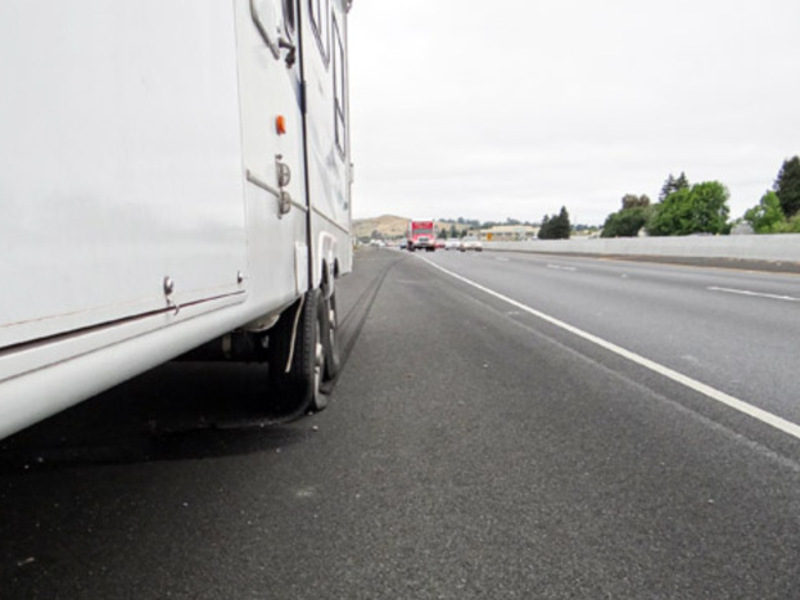
Not every RV tire blowout is caused by faulty manufacturing, worn tires, or owner neglect. Items such as nails, screws, or debris on the road can damage tires.
Avoid construction areas, unnecessary dirt roads, or locations where loose debris can damage your tires. This isn’t always possible, so a quick inspection every time you stop for fuel or a break is also helpful.
5. Too Much Weight Will Blowout RV Tires
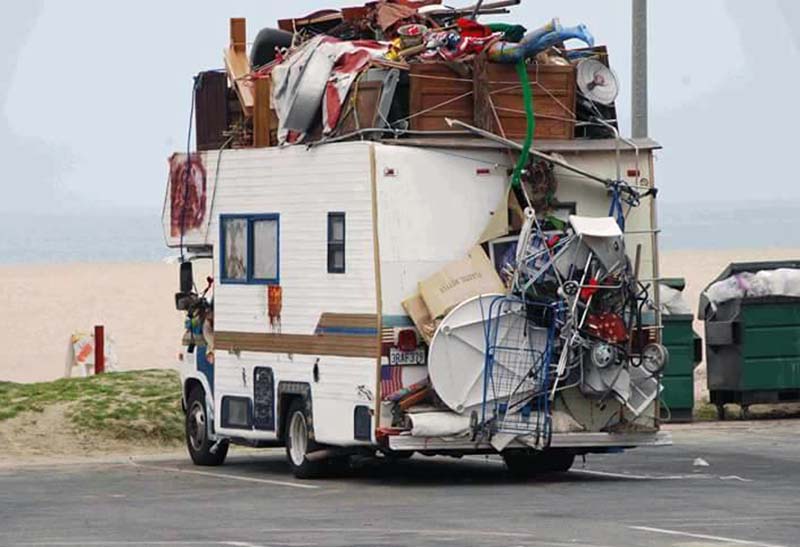
Your RV’s Gross Vehicle Weight (GVW) will affect your tires is the weight of your rig. Be vigilant by knowing how much your trailer weighs and your coach’s maximmun weight rating.
Your Unloaded Vehicle Weight (UVW), or “dry weight,” plus your Cargo Carrying Capacity (CCC), should equal your GVW Rating (or GVWR).
UVW + CCC = GVWR
Take advantage of CAT Scales or other vehicle weighing facilities to learn your RV’s weight to avoid RV tire blowouts.
To learn some great tips for reducing the weight of your RV, which we need to do as we accumulate gear over the camping season, check out our article called 20 Best Ways to Reduce RV Weight.
The increased pressure on the tires can lead to blowouts and cause the vehicle to flip or cause problems with braking. The more weight you have behind or under you, the longer it will take to stop the rig.
If you are in an accident and your RV is overweight, you could be liable for the accident. Your insurance could deny your claim because of the extra weight.
6. Tire Pressure Monitors Help You Avoid RV Tire Blowouts
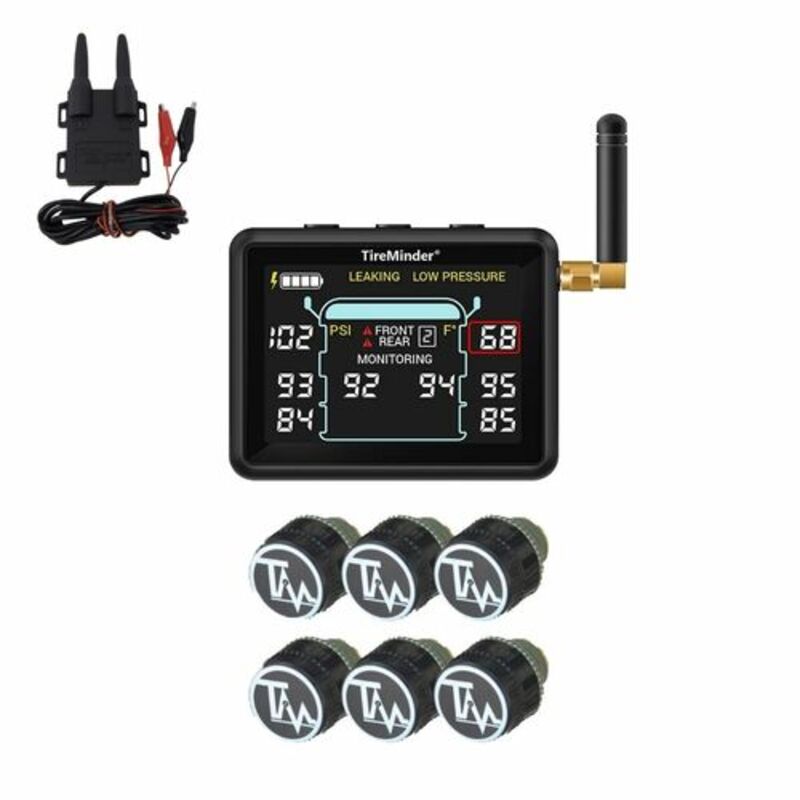
Along with other important tire monitoring, a tire pressure monitor will also help avoid RV tire blowouts. A monitoring system does not have to be expensive, and some RV manufacturers are now including them as standard equipment.
Keep in mind that low tire pressure is just as hazardous as over-inflated tires. Tires should be inflated to the maximum cold pressure listed on the tire’s sidewall, no matter the weight of your RV. A good tire pressure gauge and an air compressor are must-haves for your RV journey.
A basic tire pressure monitor, such as a TireMinder with six transmitters, is far less than your RV insurance deductible. Monitors attach to your tire valve stems, and the data relays back to your mobile device app.
Other, less expensive brands don’t use an app but have a monitor display to provide your tire’s information. The monitor tells the driver what the tire pressures are and will even alert to an imminent blowout so you can get off the road quickly before the blowout happens.
7. Use the Correct Tire Size to Avoid RV Tire Blowouts
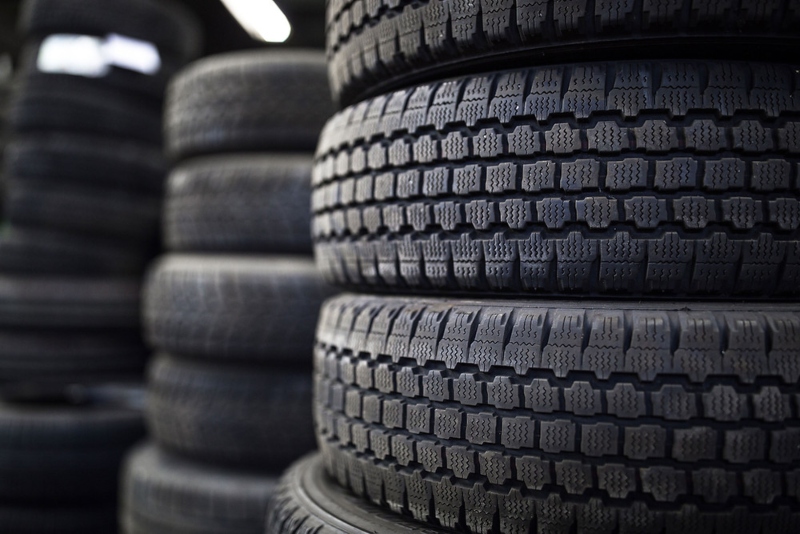
RV tires are different from car or truck tires, so you need to get the correct size and type. Look for the “ST” code on the sidewall to identify Trailer tires.
Car tires can’t be used on an RVs because there are some very important differences. RV tires have thicker sidewalls and narrower tread widths.
Since load-bearing capacity and towing are needed, they are manufactured with less priority on tread life and are designed for stresses caused by towing.
Trailer tires come in radial or bias ply. Radial tires tend to have a longer tread life. Bias-ply trailer tires have a shorter tread life but are built with a different construction method intended for heavier loads.
To properly manage the weight of your RV trailer, all tires must be identical in size, and the combined capacity of the tires must equal or exceed the GVW of the axle. The combined capacity of all the tires should exceed the loaded trailer weight by 20 percent.
8. Old Tires Can Cause RV Tire Blowouts
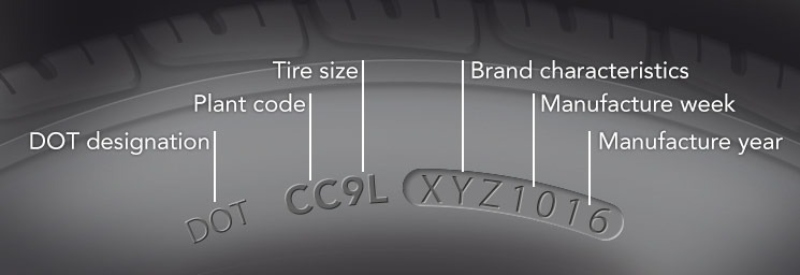
Did you know you can check to see how old your RV tires are? Well, you can, and it’s pretty easy.
Every tire has a date on it. It appears as a 4-digit number after the letters “DOT” (Department of Transportation). The 4-digit number consists of the week, and year the tire was manufactured.
The first two numbers are the week in the picture above, and the next two numbers are the year. The example shows that this tire was manufactured in the 10th week of 2016.
Unfortunately, this information is usually found on the inside of the tire. So you might have to crawl under your rig to get a good look at the date. Chock your wheels and apply the emergency brake before crawling under your RV.
Avoiding RV Tire Blowouts is Quick and Easy
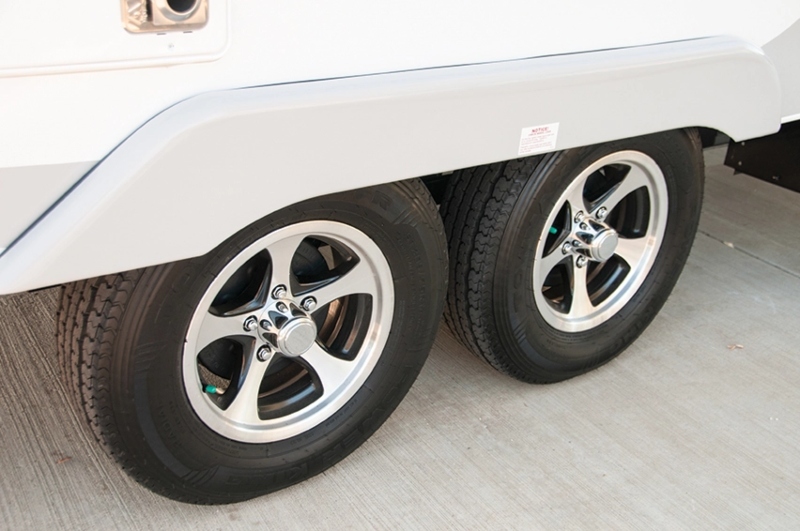
Keeping an eye on your RV tires should not be difficult or time-consuming. Have several items on your pre-trip and RV maintenance checklist.
Think of your tires as the workhorses of your motorhome or travel trailer. The more they are taken care of, the more relaxed everyone can be on the road.
Check your tires regularly and make sure they are aligned, balanced, and rotated continuously. When worn, get them replaced with the proper size and durability for your RV.
Avoid excessive heat, watch your speed, and ensure your trailer is at the proper weight. Stop at a CAT scale regularly for a weight check.
Although avoiding roads with damaging debris can be difficult, always give your tires a visual inspection.
Don’t hesitate to invest in a good tire monitoring system. The advance notice you will receive from the system could prevent a lot of damage if you have an RV tire blowout.
Above all, if you take care of your RV tires, they’ll care for you and your family. Therefore, everyone can have a great adventure avoiding an RV tire blowout.
1. 29 Must Have RV Accessories for a New Camper or Travel Trailer
2. The 5 Best RV Campground Memberships
3. Protecting Your Travels with RV Warranties: What, How, and Why
4. How To Stop Travel Trailer Sway
5. RV Recall on My Ford Motorhome: What to Do and Where to Go
About the Author
Terri Nighswonger – Author and Full Time RVer
Terri Nighswonger and her husband Todd have been RVing and work camping for six years with their Cavalier King Charles Spaniel, Newton, and their Minnie Australian Shepherd, Remi.
In Addition to the RVBlogger team, Terri has written for RV Life and RV Camping Magazine and is always excited to talk about her passion for RVing and her knowledge and experience in work camping.
Writing is Terri’s passion, but she also loves hiking, kayaking, walking her dogs, and anything she can do outdoors.
They originate from the Midwest but plan to enjoy the West for a few years, wintering in Arizona and summering wherever the road may lead.


